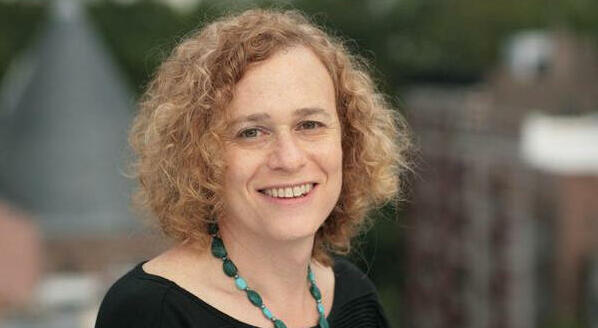CIR’s annual Poetry of the Sacred contest is underway! As we continue to accept submissions through August 1, 2022, we invite you to get to know our final judge, Joy Ladin.
Joy is a poet and professor of English at Yeshiva University, where she holds the David and Ruth Gottesman Chair in English at Stern College. In 2007, she became the first openly transgender employee of Yeshiva, an Orthodox Jewish institution. Joy has published numerous poetry collections, including The Future Is Trying to Tell Us Something, Impersonation, Transmigration, and The Book of Anna. She’s also the author of a memoir, Through the Door of Life: A Jewish Journey Between Genders and of The Soul of the Stranger: Reading God and Torah Through a Transgender Lens. Her most recent book of poems, Shekinah Speaks, is out now.
Joy recently took the time to chat with CIR and answer the following questions…
What do you find sacred?
I have a complicated relationship to the idea of the sacred, which means “set apart,” a meaning that makes it the equivalent of the Hebrew (generally translated “holy”). At first glance, the idea seems straightforward: to be sacred is to be set apart from the mundane. God is the most sacred, the most set-apart. But take the famous line, “Holy, holy, holy is the Lord of Hosts. Heaven and Earth are full of God’s glory.” On the one hand, God is triply holy, triply set apart; on the other, God is not only in contact with but filling heaven and earth.
In other words, when it comes to God, the transcendence of materiality, dailiness, the basic stuff of human life implied by the word “sacred” leads directly to immanence, the sense of God suffusing all that is. This Moebius strip idea of the sacred – the idea that what sets God apart is God’s intimate entanglement with creation – is central to my new book, Shekhinah Speaks, and to my relationship with the Divine. So what do I find sacred? God, and everything that God creates and sustains, which means everything. Maybe “sacred” means a sort of set-apart awareness, awareness that has nothing to do with functioning in the world, required to recognize the divine in everything.
What is your attraction to writing and reading poetry?
As soon as I learned to write, I started writing poetry. I don’t know why – I just know that writing poetry was the only time I felt fully alive. Reading poetry was another matter. It wasn’t until I started taking poetry workshops in high school that I started reading poetry, but I soon realized that reading and writing are intimately connected for me. When I read great poetry, I want to write poetry. I guess it’s a poet’s version of the Golden Rule: what good poems do to me, I want to do to my readers.
What is your writing practice? Is it a chore or a meditation?
Writing is work, but definitely not a chore, and I think it is only occasionally a meditation for me. It’s still what makes me feel most alive, I think because when writing I feel filled by something much larger than myself – the living language, brimming with all the meaning human beings have given to and tried to express through language. That is always thrilling.
Who do you view as part of your writing lineage?
I feel strongly anchored in many parts of the Hebrew Bible, particularly Genesis, Exodus, Numbers and Deuteronomy, the prophets, Ecclesiastes, Psalms, and the Song of Songs. I apprenticed myself to Emily Dickinson, Cesar Vallejo, Pablo Neruda, and W.H. Auden, and was strongly influenced by a number of eastern European poets as well as Tomas Transtromer. More recently I have been immersed in the classic haiku masters, Basho, Buson, and Issa.
Has your style or content changed over time? Have any themes been persistent?
I’ve been writing seriously for over 40 years, so I have covered a lot of ground in style and content – I feel that real writing always means doing or stretching toward what I don’t know how to do. But I’ve always been a poet for whom sense and meaning have been important elements of my work. While I admire poems, like many of Dickinson’s and Vallejo’s, that I don’t understand, I don’t trust my poems if I don’t have a sense of what they mean, and if I can’t test that meaning against what I feel to be true (that’s the Auden part of my heritage). I have long experimented with extended syntax – sentences that stretch over many lines and stanzas – and I think some of my strongest work has been in the voice of speakers I am not, both persona poems (where I’m speaking through a fictional persona) and heteronyms, where I let myself be taken over by another life, as I do in The Book of Anna and Shekhinah Speaks. I have written about and to God for most of my poetic life, and often about death, time, and how hard it is to be human. I like writing love poetry but wish I were better at it. More recently, I’ve been writing poems about America, democracy, and whiteness along with more personal poems about illness and my mother dying.
